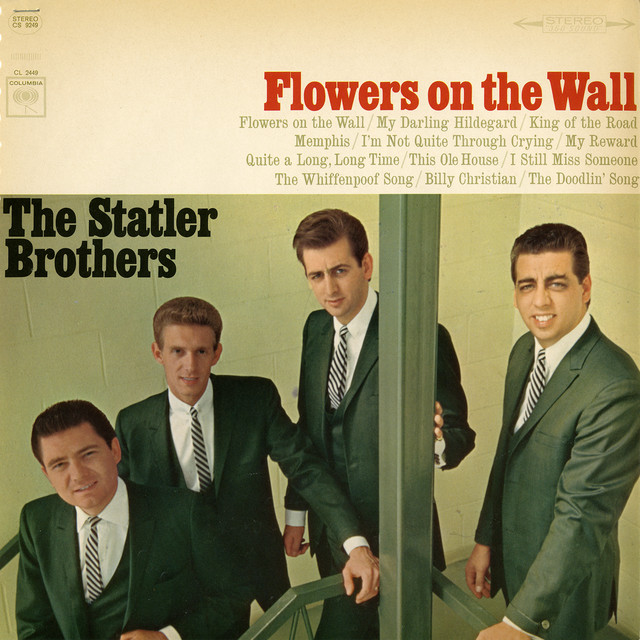“Flowers on the Wall” by The Statler Brothers is a classic country song that embodies the group’s unique blend of humor, melancholy, and impeccable vocal harmony. Released in 1965 as a single from their album of the same name, the song quickly became a hit, reaching No. 2 on the Billboard Hot Country Singles chart and No. 4 on the Billboard Hot 100. It remains one of the group’s most enduring and beloved tracks, showcasing their ability to craft songs that are both witty and emotionally resonant.

Written by Lew DeWitt, one of the original members of The Statler Brothers, “Flowers on the Wall” tells the story of a man who is coping with heartbreak and loneliness in an unconventional way. Rather than wallowing in self-pity, the protagonist of the song adopts a façade of nonchalance, engaging in mundane and solitary activities like “counting flowers on the wall,” “playing solitaire with a deck of 51,” and “smoking cigarettes and watching Captain Kangaroo.” These seemingly trivial pastimes are juxtaposed with the underlying sadness of his situation, creating a poignant contrast that is both humorous and deeply relatable.
The song’s lyrics are marked by their simplicity and dry wit. The narrator’s repetitive and mundane activities serve as a metaphor for the emptiness he feels after losing someone important in his life. The line, “Don’t tell me I’ve nothing to do,” which closes each verse, is delivered with a wry sense of irony, highlighting the futility of his attempts to keep busy and distract himself from his emotional pain. Despite the light-hearted tone of the lyrics, there is an undeniable undercurrent of sadness, making the song a perfect example of the bittersweet humor that The Statler Brothers were known for.
Musically, “Flowers on the Wall” is driven by a simple yet effective arrangement that complements the song’s narrative. The Statler Brothers’ tight vocal harmonies are front and center, with each member’s voice contributing to the rich, full sound that the group was famous for. The song’s melody is catchy and memorable, with a bouncy rhythm that contrasts with the melancholic theme of the lyrics. The combination of upbeat music and downbeat subject matter creates a unique listening experience that has helped the song endure for decades.
The success of “Flowers on the Wall” was a significant milestone for The Statler Brothers. At the time of its release, the group was just beginning to make a name for themselves, having recently joined Johnny Cash’s touring ensemble. The song’s crossover appeal, charting not only on the country charts but also on the pop charts, helped to establish them as a major force in the music industry. It earned them their first Grammy Award in 1966 for Best Contemporary (R&R) Performance – Group (Vocal or Instrumental), further solidifying their reputation as one of the most talented and versatile vocal groups of their era.
The song’s popularity has endured over the years, becoming a staple of The Statler Brothers’ live performances and a favorite among fans. Its timeless quality lies in its universal theme of coping with loss and loneliness, a theme that resonates with listeners of all ages and backgrounds. The humorous yet poignant lyrics, combined with the group’s exceptional vocal performance, have ensured that “Flowers on the Wall” remains a beloved classic in both the country and pop music genres.
In popular culture, “Flowers on the Wall” has made several notable appearances, further cementing its place in music history. One of the most famous instances is its inclusion in the soundtrack of Quentin Tarantino’s 1994 film Pulp Fiction, where it plays during a scene featuring Bruce Willis’ character. The song’s inclusion in such a high-profile film introduced it to a new generation of listeners, proving that its appeal is truly timeless.
In conclusion, “Flowers on the Wall” is a quintessential example of The Statler Brothers’ ability to blend humor, melancholy, and superb vocal harmonies into a song that is both entertaining and deeply moving. Its success in the mid-1960s helped to launch the group’s career and has ensured its place as a classic in the annals of country music history. The song’s enduring popularity is a testament to its unique charm and the universal emotions it captures, making it a piece of music that continues to resonate with audiences decades after its release.
🎵 Let’s sing along with the lyrics! 🎤
I keep hearin’ you’re concerned about my happiness
But all that thought you’re givin’ me is conscience I guess
If I were walkin’ in your shoes, I wouldn’t worry none
While you and your friends are worried about me, I’m havin’ lots of fun
Countin’ flowers on the wall
That don’t bother me at all
Playin’ solitaire ’til dawn with a deck of 51
Smokin’ cigarettes and watchin’ Captain Kangaroo
Now don’t tell me, I’ve nothin’ to do
Last night I dressed in tails, pretended I was on the town
As long as I can dream it’s hard to slow this swinger down
So please don’t give a thought to me, I’m really doin’ fine
You can always find me here, I’m havin’ quite a time
Countin’ flowers on the wall
That don’t bother me at all
Playin’ solitaire ’til dawn with a deck of 51
Smokin’ cigarettes and watchin’ Captain Kangaroo
Now don’t tell me, I’ve nothin’ to do
It’s good to see you, I must go, I know I look a fright
Anyway my eyes are not accustomed to this light
And my shoes are not accustomed to this hard concrete
So I must go back to my room and make my day complete
Countin’ flowers on the wall
That don’t bother me at all
Playin’ solitaire ’til dawn with a deck of 51
Smokin’ cigarettes and watchin’ Captain Kangaroo
Now don’t tell me, I’ve nothin’ to do
Don’t tell me, I’ve nothin’ to do